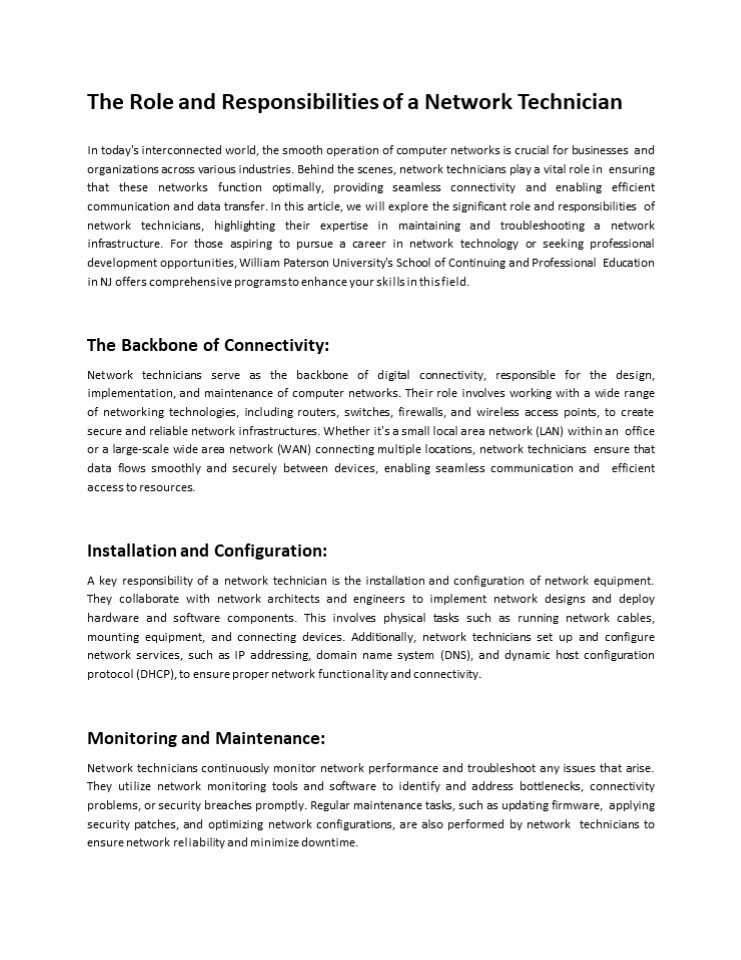The Role and Responsibilities of a Network Technician - PowerPoint PPT Presentation
Title:
The Role and Responsibilities of a Network Technician
Description:
For those interested in pursuing a career in network technology or seeking professional development opportunities, William Paterson University's School of Continuing and Professional Education in NJ offers comprehensive programs to enhance your skills and excel in this field. Embark on a rewarding journey as a network technician and become a valuable asset in the world of digital connectivity. Visit: – PowerPoint PPT presentation
Number of Views:2
Title: The Role and Responsibilities of a Network Technician
1
The Role and Responsibilities of a Network
Technician
In today's interconnected world, the smooth
operation of computer networks is crucial for
businesses and organizations across various
industries. Behind the scenes, network
technicians play a vital role in ensuring that
these networks function optimally, providing
seamless connectivity and enabling efficient
communication and data transfer. In this article,
we will explore the significant role and
responsibilities of network technicians,
highlighting their expertise in maintaining and
troubleshooting a network infrastructure. For
those aspiring to pursue a career in network
technology or seeking professional development
opportunities, William Paterson University's
School of Continuing and Professional Education
in NJ offers comprehensive programs to enhance
your skills in this field.
The Backbone of Connectivity Network technicians
serve as the backbone of digital connectivity,
responsible for the design, implementation, and
maintenance of computer networks. Their role
involves working with a wide range of networking
technologies, including routers, switches,
firewalls, and wireless access points, to create
secure and reliable network infrastructures.
Whether it's a small local area network (LAN)
within an office or a large-scale wide area
network (WAN) connecting multiple locations,
network technicians ensure that data flows
smoothly and securely between devices, enabling
seamless communication and efficient access to
resources.
Installation and Configuration A key
responsibility of a network technician is the
installation and configuration of network
equipment. They collaborate with network
architects and engineers to implement network
designs and deploy hardware and software
components. This involves physical tasks such as
running network cables, mounting equipment, and
connecting devices. Additionally, network
technicians set up and configure network
services, such as IP addressing, domain name
system (DNS), and dynamic host configuration
protocol (DHCP), to ensure proper network
functionality and connectivity.
Monitoring and Maintenance Network technicians
continuously monitor network performance and
troubleshoot any issues that arise. They utilize
network monitoring tools and software to identify
and address bottlenecks, connectivity problems,
or security breaches promptly. Regular
maintenance tasks, such as updating firmware,
applying security patches, and optimizing network
configurations, are also performed by network
technicians to ensure network reliability and
minimize downtime.
2
Security and Data Protection With the increasing
threat of cyberattacks, network security has
become a paramount concern. Network technicians
play a critical role in implementing security
measures to protect network infrastructure and
data. They configure firewalls, intrusion
detection and prevention systems, and virtual
private networks (VPNs) to safeguard network
resources from unauthorized access and data
breaches. Network technicians also participate
in incident response activities, assisting in the
investigation and resolution of security
incidents.
Professional Development and Education For
individuals interested in pursuing a career as a
network technician or seeking to advance their
skills in the field, William Paterson
University's School of Continuing and
Professional Education in NJ offers a range of
programs tailored to meet the demands of today's
network technology industry. Through
comprehensive courses and hands-on training,
students can gain in-depth knowledge of
networking fundamentals, network administration,
security protocols, and emerging technologies.
The programs provide a solid foundation to excel
as a network technician and open doors to various
career opportunities in the rapidly evolving IT
industry.
Conclusion As the backbone of digital
connectivity, network technicians play a vital
role in ensuring the smooth operation of
computer networks. From installation and
configuration to monitoring, maintenance, and
security, their expertise is essential in
maintaining efficient and secure network
infrastructures. For those interested in
pursuing a career in network technology or
seeking professional development opportunities,
William Paterson University's School of
Continuing and Professional Education in NJ
offers comprehensive programs to enhance your
skills and excel in this field. Embark on a
rewarding journey as a network technician and
become a valuable asset in the world of digital
connectivity.































